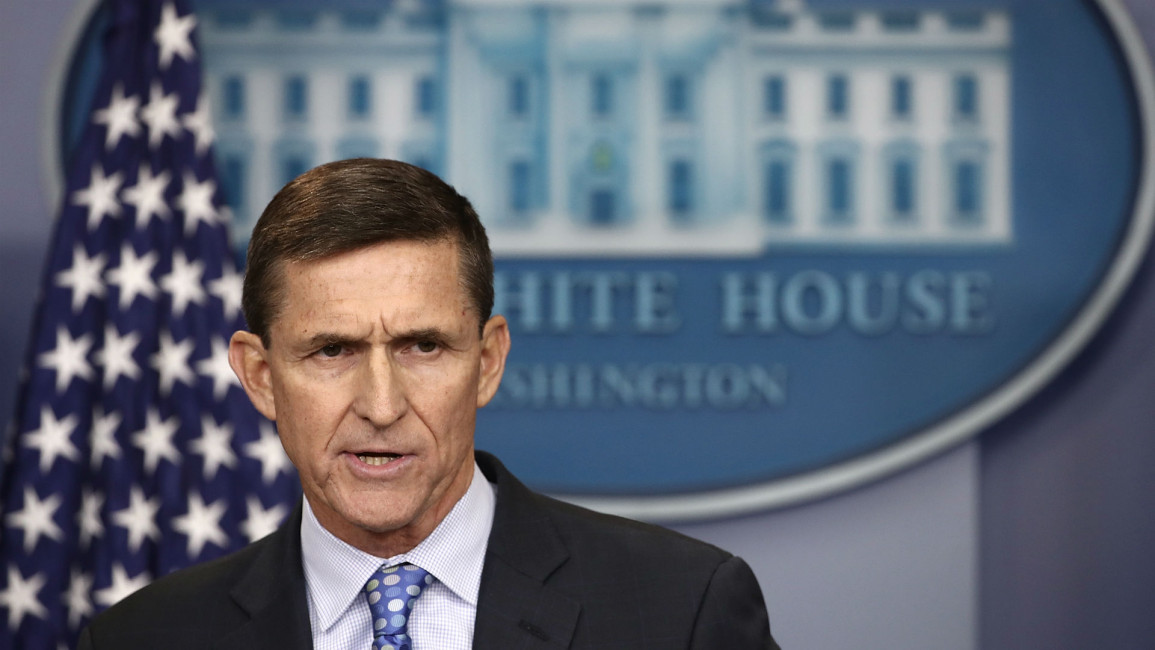Turkey lobbyist Flynn blocked Raqqa operation over 'Ankara opposition'
Former US National Security Adviser Michael Flynn has reportedly blocked a military plan against the Islamic State group in Raqqa due to opposition from Turkey, a country which paid him over $500,000 to lobby for, the McClatchy news site reported.
Days before Trump took office, Flynn reportedly declined a request from the outgoing Obama administration to approve a joint military operation with Kurdish forces against IS in the Syrian city of Raqqa, the report said.
According to timelines distributed by members of Congress, Flynn told the then national security adviser, Susan Rice, to hold off on the operation, an order which would delay military action for months.
It is not known whether he consulted anyone on the transition team about the move, and there is no recorded explanation of his motives.
His position, however, is consistent with Turkey's position in Syria, which opposes US cooperation with Kurdish forces.
Flynn resigned in February following reports that he had misled Vice-president Mike Pence and other officials about his contacts with Russia.
A month later, he disclosed in a declaration to the Foreign Agent Registration Unit of the justice department that he had been paid $530,000 for work which "could be construed to have principally benefited the Republic of Turkey", his paperwork said.
Citizens who lobby for foreign governments or political bodies must legally disclose their work to the justice department within ten days.
In early May, Trump authorised limited supplies of arms to Kurdish-dominated Syrian Democratic Forces' fighters for military operations against IS in Raqqa.
"Our intent is to work with the Turks, alongside one another, to take Raqqa down, and we're going to sort it out and we'll figure out how we're going to do it," US Defence Secretary Jim Mattis said at the time.
The White House had already given the Pentagon the green light to deliver weapons to the Kurdish Peoples' Protection Units (YPG), a group of Kurdish fighters battling IS extremists, despite furious objections from Ankara.
 |
Our intent is to work with the Turks, alongside one another, to take Raqqa down, and we're going to sort it out and we'll figure out how we're going to do it. - US Defence Secretary Jim Mattis |
 |
Washington and Ankara are bitterly at odds over US support for the YPG, a Syrian-Kurdish armed faction that acts as the main ground force in the Pentagon's plan to defeat the Islamic State group. Turkey deems a front for the banned Kurdistan Workers' Party (PKK).
On Tuesday, Turkish President Recep Tayyip Erdogan met Donald Trump in the White House, where he again raised objections to US support for Kurdish armed groups.
"It is absolutely unacceptable to take the YPG-PYD into consideration as partners in the region," he said.
Several days after the meeting, on Thursday, Turkey called for the removal of a US diplomat coordinating the coalition fighting IS, accusing him of backing Syrian Kurdish groups.
"Brett McGurk is definitely giving support to PKK and YPG. It would be useful if this person was replaced," Foreign Minister Mevlut Cavusoglu told the private NTV television.
Turkey fears that weapons delivered to Syrian fighters could end up in the hands of the PKK and be turned on Turkish targets.
In April, Turkey bombed US-backed Kurdish forces in Syria and Iraq, killing at least 20 fighters. The attack angered the US, who said the airstrikes were carried out without any prior notification.
Last year, in October, Turkey launched dozens of airstrikes on SDF forces north of Aleppo who had recently retaken territory from IS, with the military claiming up to 200 fighters had been killed in the bombing campaign.


![President Pezeshkian has denounced Israel's attacks on Lebanon [Getty]](/sites/default/files/styles/image_684x385/public/2173482924.jpeg?h=a5f2f23a&itok=q3evVtko)



 Follow the Middle East's top stories in English at The New Arab on Google News
Follow the Middle East's top stories in English at The New Arab on Google News


